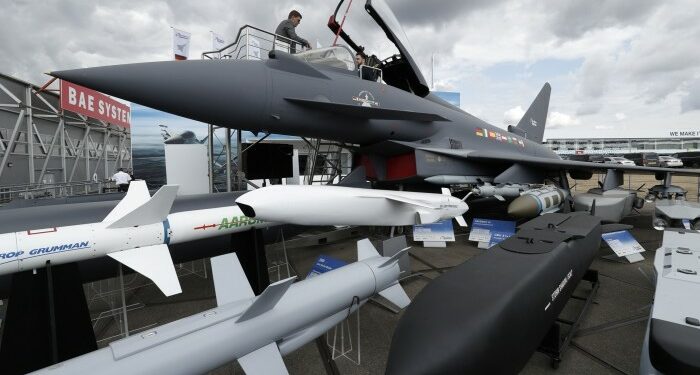Simply sign up to the Aerospace & Defence myFT Digest — delivered directly to your inbox.
The writer is a professor at Arizona State University and author of the forthcoming book ‘Putin’s Sledgehammer: The Wagner Group and Russia’s Collapse into Mercenary Chaos’
The Biden administration’s decision to let Ukraine conduct Atacms strikes inside Russia illustrates a reality of modern warfare: industrial capacity now shapes deterrence as powerfully as political will. As Washington creates a narrow window for Ukraine to employ American precision strike capabilities before January’s transition to a Trump presidency, European powers are racing to rebuild their defence industrial base for a more uncertain future.
Last month’s UK-German Trinity House Agreement underscores the trend. Their commitment to “rapidly develop brand-new extended deep strike weapons” represents more than military co-operation. It’s an acknowledgment that peacetime production models cannot meet the demands of sustained high-intensity conflict. When German defence minister Boris Pistorius speaks of “what these times require”, he’s articulating a new industrial imperative that could reshape Europe’s defence sector.
The timing is crucial. At roughly $1.3mn a pop, every American Atacms missile fired at North Korean positions in Kursk or Russian logistics nodes is a costly loss of capability irreplaceable until production lines adapt. As the US moves from Atacms to the Precision Strike Missile system, manufacturers must maintain legacy systems while ramping up next-generation capacity.
Such constraints force hard choices about immediate battlefield impact versus long-term deterrence requirements. Joe Biden’s protracted hesitation over Ukraine’s strike capabilities reflected this reality. In particular, Pentagon officials focused on how Nato’s decade of defence austerity had created vulnerabilities to Kremlin pressure.
Washington’s scepticism about European strategic autonomy has been well founded, given the EU’s fractured defence priorities amid rising far-right influence. Yet Brussels’ rollout of an unprecedented unified defence industrial strategy signals an emerging appetite for change.
Europe is starting to grasp that defence industrial capacity has become as crucial to diplomatic leverage as military heft. The Trinity House pact paves the way for a new artillery gun barrel factory in the UK, supporting 400 jobs and promising nearly £500mn in economic benefits. More significantly, it could reduce British and German reliance on US precision strike systems.
This industrial realignment comes as German Chancellor Olaf Scholz conducted his first conversation with Vladimir Putin in nearly two years. The timing — just weeks after the defence accord with Britain — shows how industrial capacity undergirds diplomatic engagement. European leaders are increasingly framing support for Ukraine in terms of sustainable production capability rather than immediate military aid.
In contrast to Washington, which is racing against a political calendar that could see sharp policy shifts under Donald Trump, European powers are building industrial capacity that can survive political transitions. A Franco-British-German alignment on precision strike capabilities is a hedge against potential changes in US strategic priorities.
For defence manufacturers, this creates opportunity and urgency. Storm Shadow missiles’ effectiveness against high-value targets in Crimea has confirmed the value of precision strike capabilities. Yet current production rates cannot sustain high-intensity operations while maintaining deterrent stockpiles. European defence firms must scale up production capacity at a pace not seen since the cold war.
The industrial shift goes beyond missiles. The Trinity House pact — with its extra focus on unmanned systems, underwater defence and integrated air capabilities — signals a deeper transformation of European defence manufacturing. Rheinmetall CEO Armin Papperger’s pledge to bolster UK defence technology leadership with German knowhow reflects the new approach.
The next six months will test whether this industrial mobilisation can meaningfully affect battlefield dynamics in Ukraine. As Putin and Kim Jong Un calculate their responses to expanded western strike capabilities, they’re betting against industrial capacity rather than military capability.
For investors and policymakers, the message is that European security will depend on industrial policy as much as military strategy. Along with Storm Shadow strikes in Ukraine, innovations in defence industrial co-operation suggest that European powers understand this. The question is whether their defence industrial base can adapt quickly enough to matter.
Source link : http://www.bing.com/news/apiclick.aspx?ref=FexRss&aid=&tid=6743374587444f5fa8febff49811eb7e&url=https%3A%2F%2Fwww.ft.com%2Fcontent%2F3c96bd9e-6c3e-4a5a-9513-39dbc01b4c8d&c=7913309159951999183&mkt=de-de
Author :
Publish date : 2024-11-24 05:00:00
Copyright for syndicated content belongs to the linked Source.


